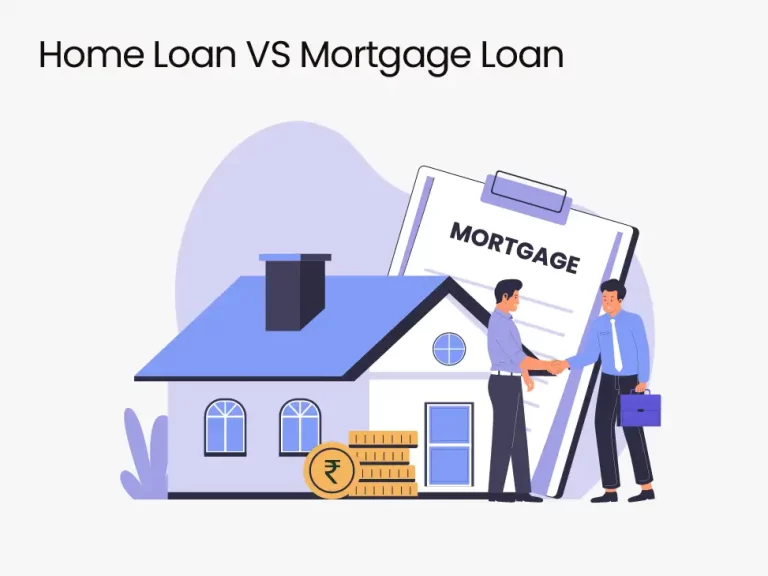Rashi Sood
Last Updated on 7th October 2025

Rashi Sood
Last Updated on 7th October 2025
When you need financial support for buying a house or meeting other expenses, banks and lenders offer different types of loans. Two of the most common are the home loan and the mortgage loan. While the terms are often used interchangeably, they are not the same. Each serves a different purpose and comes with its own features, benefits, and conditions. Understanding the difference between a home loan and a mortgage loan can help you make a clear and informed decision.
Read this blog to understand the differences between home loans and mortgage loans, their pros and cons, and the common myths around them.
Table of Contents
A home loan is money borrowed from a bank or financial institution to buy, build, or renovate a house. The loan amount is usually disbursed directly to the property seller or builder, and the property itself becomes collateral for the bank until the loan is repaid.
Key features of home loans:
A mortgage loan is broader. In simple terms, it is money borrowed by pledging a property (residential, commercial, or land) as security. Unlike home loans, the borrowed funds can be used for a variety of purposes, such as:
Here, the property remains in your name, but the bank has legal rights over it until the loan is cleared. This is why people often call it a house mortgage loan or a loan against property.
Key features of mortgage loans:
In banking, a mortgage means using your property as security for a loan. You still own the property, but the lender has the right to sell it if you don’t repay the loan. This is the basic idea behind all home mortgage loans and other loans taken against property.
Here’s a side-by-side look at the difference between a mortgage loan and a home loan:
|
Feature |
Home Loan |
Mortgage Loan |
|
Purpose |
To buy, build, or renovate a home |
For business, education, medical needs, or other personal expenses |
|
Collateral |
The home being purchased or constructed |
Any property (residential, commercial, land) |
|
Tenure |
Up to 30 years |
Up to 15 years |
|
Interest Rate |
Lower (since it’s for housing) |
Higher compared to home loans |
|
Tax Benefits |
Available on principal and interest |
Not usually available |
|
Disbursement |
Paid directly to seller/builder |
Paid to the borrower for flexible use |
Choosing between home loans and mortgage loans depends on your needs.
One of the biggest deciding factors is the cost of borrowing.
Over a long tenure, even a small difference in rate can add up to lakhs of rupees in extra repayment. So, comparing rates before choosing between mortgage vs loan options is crucial.
One major difference between a mortgage and a home loan is tax savings.
This makes home loans more attractive if your goal is residential ownership.
When comparing a home loan vs a mortgage loan, it’s not about which one is better overall, but which suits your situation. If you are buying or constructing a house, go for a home mortgage loan. If you already own property and need funds for other purposes, a mortgage loan works best.
The main difference lies in the purpose. A home loan is specifically for buying, constructing, or renovating a house. A mortgage loan, also known as a loan against property, can be used for various purposes, such as business expansion, education, or personal expenses. While every home loan is technically a mortgage, not every mortgage loan is a home loan.
Yes. A mortgage loan offers flexibility and is not limited to purchasing property. Once you pledge your residential or commercial property, the borrowed funds can be used for almost anything—paying medical bills, funding higher studies, consolidating debt, or growing your business.
Yes, there is usually a difference. Home loan interest rates are generally lower because they are considered safer and often supported by government housing initiatives. Mortgage loan interest rates are higher since the end use is flexible and can carry more risk for the lender.
It depends on your situation. A home loan requires detailed property documents and approval of the builder or project, so that the process can take longer. A mortgage loan may be easier if you already own a clear, marketable property, as the bank mainly assesses its value rather than the end use of funds.
Yes. Home loans typically come with longer tenures, up to 25–30 years, which makes EMIs smaller and more manageable. Mortgage loans usually have shorter tenures, around 10–15 years, which means higher EMIs even if the loan amount is similar.